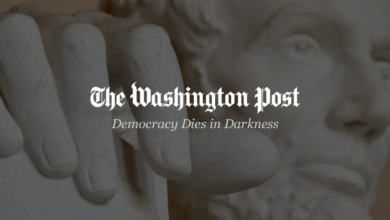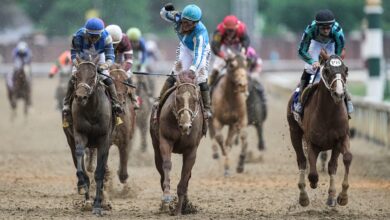Binance Founder Sentenced to 4 Months in Prison

Changpeng Zhao, the billionaire founder of the giant cryptocurrency exchange Binance, was sentenced on Tuesday to four months in prison, a much lighter penalty than other crypto executives have faced since the industry imploded in 2022.
Mr. Zhao pleaded guilty last year to a money-laundering violation, acknowledging that his company allowed terrorist groups and other criminals to have access to its platform. Defense lawyers asked for probation without any prison time, while prosecutors requested a three-year sentence, calling it an “unprecedented” crime.
But Judge Richard A. Jones, who oversaw the case in U.S. District Court in Seattle, said in court on Tuesday that Mr. Zhao had taken responsibility for his offenses and was unlikely to break the law again.
“Your conduct does not warrant a 36-month sentence,” Judge Jones said. He called Mr. Zhao “a dedicated family man and a giving person” and praised his “staggering accomplishment” in building Binance.
Wearing a dark suit and light blue tie, Mr. Zhao, 47, did not visibly react as the sentence was announced. But he nodded vigorously during Judge Jones’s statement and touched his hand to his heart.
“I failed here,” Mr. Zhao said in brief remarks to the court. “I deeply regret my failure, and I’m sorry.”
It was not immediately clear when Mr. Zhao would report to prison. His lawyers asked the judge to expedite the process, and requested that he serve his sentence at SeaTac, a federal prison in the Seattle area.
The sentencing was the second high-profile penalty this year in the Justice Department’s campaign to root out criminal behavior in the crypto industry. In March, Sam Bankman-Fried, the founder of the collapsed FTX exchange and Mr. Zhao’s onetime business rival, was sentenced to 25 years in prison for fraud.
But Mr. Zhao’s sentence was an extraordinary contrast to Mr. Bankman-Fried’s penalty and the consequences that likely await other crypto executives who have been accused of crimes. Do Kwon, another high-profile crypto founder, was charged with fraud last year and sent to jail in Montenegro, as he awaits extradition to either the United States or his home country, South Korea. Alex Mashinsky, the chief executive of the failed crypto bank Celsius, is battling charges that carry decades of prison time.
Mr. Zhao’s four-month sentence is “an egregious miscarriage of justice and sends exactly the wrong message to criminals worldwide,” said Dennis Kelleher, the president of Better Markets, a nonprofit that supports stringent financial regulation.
Representatives for Mr. Zhao’s legal team and the Justice Department declined to comment. In a letter to Congress this week, Carlos Uriarte, an assistant attorney general, said lawmakers should establish harsher penalties for violations of the Bank Secrecy Act, the law that Mr. Zhao admitted to breaking.
Not long ago, Mr. Zhao stood atop the multitrillion-dollar crypto industry, with a large fortune and a devoted online following. Binance was the most powerful crypto company in the world, processing as much as two-thirds of all transactions. But it also faced investigations by several U.S. agencies into whether Mr. Zhao had broken the law to build his empire.
Facing intense legal scrutiny, Mr. Zhao, who goes by the initials CZ, was often dismissive. He described the concerns about Binance as “FUD,” or fear, uncertainty and doubt — shorthand in the crypto world for false rumors intended to hurt a business.
In November 2022, Mr. Zhao’s industry power increased after he helped bring down Mr. Bankman-Fried with a series of social media posts — Mr. Zhao has millions of followers on X — that prompted a run on FTX’s accounts. When FTX didn’t have the money to repay its customers, Mr. Zhao briefly agreed to buy the exchange, before pulling out of the deal. Soon Mr. Bankman-Fried was arrested on fraud charges, leaving Mr. Zhao as the industry’s dominant figure.
But behind the scenes, Mr. Zhao and Binance were negotiating with federal prosecutors, hoping to escape their own legal woes. Mr. Zhao lived in the United Arab Emirates, which does not have an extradition treaty with the United States, and prosecutors wanted an agreement that would force him to face criminal charges. With a possible indictment on the horizon, Mr. Zhao hired a team of white-collar defense lawyers at the well-known law firm Latham & Watkins.
Then he cut a deal.
In November, Binance agreed to pay $4.3 billion to several U.S. agencies, including the Justice Department, to settle charges that it had permitted terrorist organizations like Hamas, the Islamic State and Al Qaeda to use its platform. Prosecutors said that, under Mr. Zhao’s watch, Binance had refused to comply with American sanctions, allowing access to customers in countries like Iran, Syria and Cuba. The company also failed to report suspicious transactions involving narcotics and child sexual abuse materials, the government said.
Mr. Zhao told Binance employees that it was “better to ask for forgiveness than permission,” prosecutors said in a recent court filing. He also bragged that if Binance had complied with U.S. law, it would not be “as big as we are today,” the prosecutors wrote.
But unlike Mr. Bankman-Fried and other crypto executives, Mr. Zhao pleaded guilty to only a single criminal count. He admitted that he had failed to establish an adequate anti-money-laundering system at Binance, resigned as the company’s chief executive and agreed to a $50 million fine. But he retained his ownership stake in Binance and, with it, a $33 billion fortune, according to Forbes, making him crypto’s wealthiest executive.
In court filings last week, prosecutors said Mr. Zhao’s crime carried a sentence of 12 to 18 months in prison under federal guidelines. But they asked Judge Jones to impose a three-year term, arguing that he had violated the law “on an unprecedented scale.”
“This wasn’t a mistake — it wasn’t a regulatory oops,” Kevin Mosley, a lawyer in the Justice Department’s money-laundering section, said in court on Tuesday. “Breaking U.S. law was not incidental to his plan to make as much money as possible. Violating the law was integral to that endeavor.”
Defense lawyers countered that Mr. Zhao had demonstrated remorse and accepted responsibility for his crime, and shouldn’t face any time behind bars. They said he had not been charged with fraud or stealing anyone’s money, the crimes that Mr. Bankman-Fried committed. And they cast Mr. Zhao as a committed philanthropist who intended to give away the vast majority of his wealth.
During the hearing, Mr. Zhao’s sister, mother and son, a freshman at Pepperdine University, sat behind him in the gallery. In remarks to Judge Jones, William Burck, a lawyer for Mr. Zhao, argued that the three-year recommendation was significantly harsher than penalties faced by other defendants charged with similar offenses.
He called the prosecution’s sentencing submission “extraordinarily punitive and completely unfair.”
Ultimately, Judge Jones agreed that the recommendation was over the top. As the judge explained his reasoning, Mr. Zhao’s son silently pumped his fist.
Since his guilty plea, Mr. Zhao has remained in the United States, after Judge Jones rejected his request to return home to Dubai before the sentencing. He has spent the last few months traveling across the country, including to New York, Los Angeles and Telluride, Colo.
Mr. Zhao has already laid the groundwork for his next act. He has networked with other entrepreneurs and unveiled an online education platform called Giggle Academy, which he said would involve artificial intelligence. And he has spoken with start-ups working in biotechnology, an area in which he’s interested in investing.
Through his ownership of Binance, Mr. Zhao also remains poised to benefit from the growth of the crypto industry, which has experienced a resurgence in recent months.
“He still stands to continue profiting handsomely from the operations of that company,” Mr. Mosley said in court.
Glenn Thrush contributed reporting from Washington.




